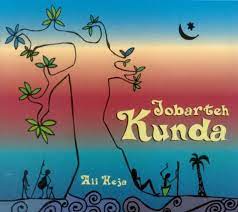Schneeball Records
distribution: INDIGO

KUNDA JOBARTEH
"Ali Heja"

The "white" griot Tormenta Jobarteh and his 8-member clan (with musicians from Ismael Isaak, Robbie Neville, Chaka Khan, Burning Spear or Fernando Cruz) will start a major tour of Germany with their new CD "Ali Heja" at the end of March 2003 ": a captivating mix of styles from traditional Africa, the Caribbean, Pop & Jazz - always danceable, full of energy and pure joie de vivre!
The name of this band says it all: Kunda (Clan), a family of eight musicians, practically from eight different musical "families", two of them from the extensive family network of the internationally esteemed Jobarteh Griot family. (English spelling, or "Dioubaté", French spelling)
The genesis of this long-maturing project is fascinating and unusual, as is its sound.
The co-initiator of the Tormenta Jobarteh group grew up in Munich, where he studied drums at the Dante Augustini Institute. But his African soul gave him the drive to find his home, his "Kunda" again.
As a musician, he toured Europe, Asia and the USA in various line-ups until he met a band from The Gambia in 1987 and was invited by them to the small West African country surrounded by Senegal. And this had its most far-reaching consequences, because it was there that he heard the wonderful sound of the kora for the first time, played by a musician who mastered this great West African instrument, a harp lute, with virtuosity.
With his musical mentor Basuro Jobarteh, the recognized griot of Boraba, Fulladou, Tormenta spent eight years in Boraba until the intensive study of the Kora, the Mandinka language and the entire Mande culture was successfully completed. Tormenta got so used to the culture of his adopted home that he was adopted by the Jobarteh family.
Griots (in the Mandinka language Jaliya) are musicians, historians, chroniclers, storytellers and wise advisors rolled into one. Their tradition is passed down from father to son and they have enjoyed great respect among the population for many centuries.
Jobarteh was finally also appointed a griot, with all rights and duties - probably unique for a non-African with white skin. Commissioned by the overwhelming honor and enriched with the great experience of finally having found his "Kunda" and now being able to give it an expression musically, linguistically and in terms of content, Tormenta Jobarteh began this experience, as well as the rich culture of the Mande-Griots, to Germany and Central Europe and to develop a corresponding new musical concept in relation to its own African-European history. A concept that has its spiritual approach in the mutual understanding of these two large and culturally rich continents.
In 1995 he met Mori Dioubatè at a concert, who eventually became the band's second co-initiator. Mori Dioubatè comes from the same old griot family that Tormenta adopted. At the age of three he began to play the balafon, an African type of xylophone. His outstanding skills made him one of the most respected and sought-after musicians in West Africa. He played in the "Ballet national de Guinée", the Ivory Coast television orchestra, and was a member of Mory Kante.
The two Griots decided to set up a joint project - Jobarteh-Kunda was born. Numerous appearances followed and consolidated both the repertoire and the good reputation of this band. Gradually, traditional songs were rearranged, modernized and combined with new titles to form a coherent program for the ambitious project.
By the time the first CD "Abaraka" (Indigo) was recorded in the spring of 1999, the line-up was completed by top-class musicians. The CD "Abaraka" had international success (the song "Afrika" became the title track of the film "Anansi" by Fritz Baumann - now in theaters since February 2003!).
The different musical roots of these musicians finally added influences from other cultures and musical traditions to the originally purely West African style: Caribbean style elements were integrated as well as influences from jazz and pop. As a result, the music of Jobarteh-Kunda is extremely attractive and rich in variety, it is world music in the literal sense. The band played among others. as support from Miriam Makeba at the Tollwood Festival in Munich in front of 6000 completely enthusiastic listeners.
On their current CD "Ali Heja" the group presents a further development of their music. In the meantime, after two years of intensive work and numerous appearances, the band has grown together into a single unit. Jobarteh Kunda dispenses with keyboard and sampler carpets and creates a modern and compact sound with the power of her acoustic instrumentation (except for electric bass and electric guitar).
The name of this band says it all: Kunda (Clan), a family of eight musicians, practically from eight different musical "families", two of them from the extensive family network of the internationally esteemed Jobarteh Griot family. (English spelling, or "Dioubaté", French spelling)
The genesis of this long-maturing project is fascinating and unusual, as is its sound.
The co-initiator of the Tormenta Jobarteh group grew up in Munich, where he studied drums at the Dante Augustini Institute. But his African soul gave him the drive to find his home, his "Kunda" again.
As a musician, he toured Europe, Asia and the USA in various line-ups until he met a band from The Gambia in 1987 and was invited by them to the small West African country surrounded by Senegal. And this had its most far-reaching consequences, because it was there that he heard the wonderful sound of the kora for the first time, played by a musician who mastered this great West African instrument, a harp lute, with virtuosity.
With his musical mentor Basuro Jobarteh, the recognized griot of Boraba, Fulladou, Tormenta spent eight years in Boraba until the intensive study of the Kora, the Mandinka language and the entire Mande culture was successfully completed. Tormenta got so used to the culture of his adopted home that he was adopted by the Jobarteh family.
Griots (in the Mandinka language Jaliya) are musicians, historians, chroniclers, storytellers and wise advisors rolled into one. Their tradition is passed down from father to son and they have enjoyed great respect among the population for many centuries.
Jobarteh was finally also appointed a griot, with all rights and duties - probably unique for a non-African with white skin. Commissioned by the overwhelming honor and enriched with the great experience of finally having found his "Kunda" and now being able to give it an expression musically, linguistically and in terms of content, Tormenta Jobarteh began this experience, as well as the rich culture of the Mande-Griots, to Germany and Central Europe and to develop a corresponding new musical concept in relation to its own African-European history. A concept that has its spiritual approach in the mutual understanding of these two large and culturally rich continents.
In 1995 he met Mori Dioubatè at a concert, who eventually became the band's second co-initiator. Mori Dioubatè comes from the same old griot family that Tormenta adopted. At the age of three he began to play the balafon, an African type of xylophone. His outstanding skills made him one of the most respected and sought-after musicians in West Africa. He played in the "Ballet national de Guinée", the Ivory Coast television orchestra, and was a member of Mory Kante.
The two Griots decided to set up a joint project - Jobarteh-Kunda was born. Numerous appearances followed and consolidated both the repertoire and the good reputation of this band. Gradually, traditional songs were rearranged, modernized and combined with new titles to form a coherent program for the ambitious project.
By the time the first CD "Abaraka" (Indigo) was recorded in the spring of 1999, the line-up was completed by top-class musicians. The CD "Abaraka" had international success (the song "Afrika" became the title track of the film "Anansi" by Fritz Baumann - now in theaters since February 2003!).
The different musical roots of these musicians finally added influences from other cultures and musical traditions to the originally purely West African style: Caribbean style elements were integrated as well as influences from jazz and pop. As a result, the music of Jobarteh-Kunda is extremely attractive and rich in variety, it is world music in the literal sense. The band played among others. as support from Miriam Makeba at the Tollwood Festival in Munich in front of 6000 completely enthusiastic listeners.
On their current CD "Ali Heja" the group presents a further development of their music. In the meantime, after two years of intensive work and numerous appearances, the band has grown together into a single unit. Jobarteh Kunda dispenses with keyboard and sampler carpets and creates a modern and compact sound with the power of her acoustic instrumentation (except for electric bass and electric guitar).

